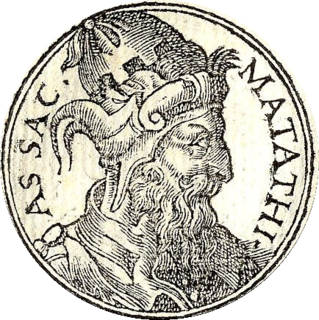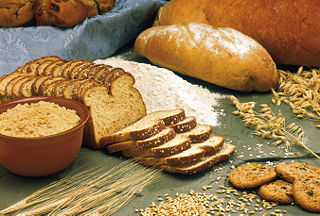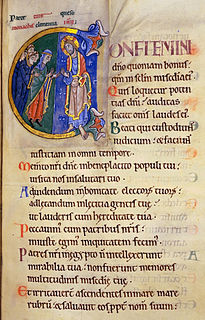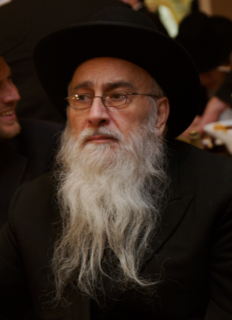The Siddur (prayerbook) of Saadia Gaon is the earliest surviving attempt to transcribe the weekly ritual of Jewish prayers for week-days, Sabbaths, and festivals. The text also contains liturgical poetry by Saadia, as well as Arabic language commentary. There is no known extant manuscript of the entire text, though there is a near complete manuscript in Oxford. Fragments have also been found in the Cairo Genizah. The prayerbook apparently served as a basis for later efforts to codify the Jewish prayer ritual and set it down in writing and was imitated by later authors.

Mattathias ben Johanan was a Kohen whose role in the religion-driven Maccabean Revolt against the Greek Seleucid Empire is related in the Books of the Maccabees. Mattathias is accorded a central role in the story of Hanukkah and, as a result, is named in the Al HaNissim prayer Jews add to the Birkat Hamazon and the Amidah during the festival's eight days.

Birkat Hamazon, known in English as the Grace After Meals, is a set of Hebrew blessings that Jewish Halakha prescribes following a meal that includes at least a kezayit piece of bread or matzoh made from one or all of wheat, barley, rye, oats, and/or spelt. It is a mitzvah de'oraita, that is written in the Torah.
In Judaism, a berakhah, bracha, brokho, brokhe is a formula of blessing or thanksgiving, recited in public or private, usually before the performance of a commandment, or the enjoyment of food or fragrance, and in praise on various occasions.

Berakhot is the first tractate of Seder Zeraim of the Mishnah and of the Talmud. The tractate discusses the rules of prayers, particularly the Shema and the Amidah, and blessings for various circumstances.
Birkat HaBayit is a Jewish prayer often inscribed on wall plaques or hamsas and featured at the entrance of some Jewish homes. There are various versions of the prayer.
Bendigamos is a hymn sung after meals according to the custom of Spanish and Portuguese Jews. It has also been traditionally sung by the Jews of Turkish descent. It is similar in meaning to the Birkat Hamazon that is said by all Jews. Bendigamos is said in addition to Birkat Hamazon, either immediately before or immediately after it. The text is in modern Spanish, not Ladino. The prayer was translated by David de Sola Pool. Below is the actual text as well as the translation by de Sola Pool. The melody is one of the best known and loved Spanish and Portuguese melodies, used also for the Song of the Sea and sometimes in "Hallel".
The House of Hillel and House of Shammai were two schools of Jewish scholars during the period of tannaim, named after the sages Hillel and Shammai who founded them. These two schools had vigorous debates on matters of ritual practice, ethics, and theology which were critical for the shaping of the Oral Law and Judaism as it is today.
Ruth Langer is a Professor of Theology at Boston College, and a noted expert on Jewish Liturgy and on Christian Jewish Relations. She is married to Jonathan Sarna.
Al HaNissim alternatively V'al HaNissim is an addition to the Amidah and Birkat Hamazon on Hanukkah and Purim. On both holidays, it starts off with a short paragraph, beginning with the words for which it is named. After that, each holiday has a unique paragraph, describing the events for which that day is celebrated.
A birchon also birkon is a booklet of prayers based around a particular event such as the Jewish sabbath. The most common form is Birkat Hamazon often titled סדר ברכת המזון - Seder Birkat Hamazon in Hebrew. Some editions actually have the Birkat Hamazon prayer in the back, appearing almost as an afterthought. Birchonim are commonly known as bentchers in Yiddish in the Ashkenazi community, and in places heavily influenced by Ashkenazi Jews.

Psalm 126 is the 126th psalm of the Book of Psalms, generally known in English by its first verse, in the King James Version, "When the Lord turned again the captivity of Zion, we were like them that dream", and in Hebrew by its opening words, "Shir HaMaalot". It is one of the fifteen Songs of Ascent in the Book of Psalms, the third section of the Hebrew Bible, and a book of the Christian Old Testament. In the Greek Septuagint version of the Bible, and in its Latin translation in the Vulgate, this psalm is Psalm 125 in a slightly different numbering system. In Latin, it is known as In convertendo Dominus.
Psalm 29 is the 29th psalm from the Book of Psalms.

Psalm 37 is the 37th psalm of the Book of Psalms. It has the form of an acrostic Hebrew poem, and is thought to have been written by David in his old age.

Psalm 136 is the 136th psalm of the biblical Book of Psalms. In the Greek Septuagint version of the bible, and in its Latin translation in the Vulgate, this psalm is Psalm 135 in a slightly different numbering system. It is sometimes referred to as "The Great Hallel".

Psalm 106 is the 106th psalm of the biblical Book of Psalms. In the Greek Septuagint version of the bible, and in its Latin translation in the Vulgate, this psalm is Psalm 105 in a slightly different numbering system.

Psalm 115 is the 115th psalm of the biblical Book of Psalms. It is part of the Egyptian Hallel sequence in the Book of Psalms.

The Birkat haMinim is a Jewish curse on heretics (minim). Modern scholarship has generally evaluated that the Birkat haMinim probably did originally include Jewish Christians before Christianity became markedly a gentile religion. It is the 12th of the Eighteen Benedictions or Amidah.

Yitzchak Abadi is an Orthodox Jewish Rabbi and Posek and a prominent leader of Orthodox Judaism in the United States and around the world.